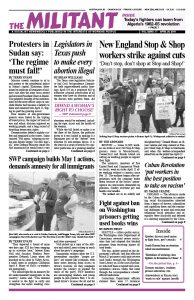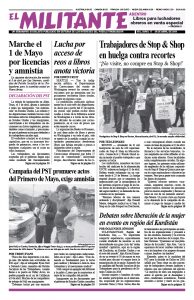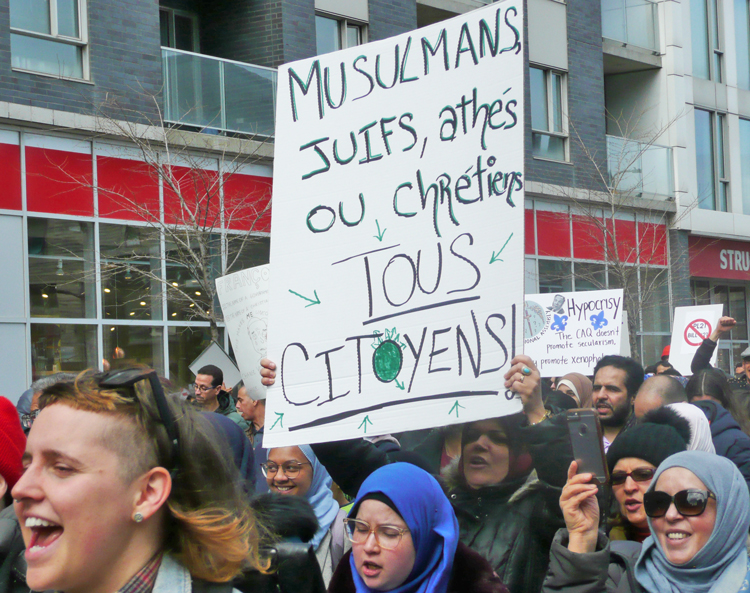MONTREAL — Chanting, “One, two, three, cancel this law,” several thousand people marched here April 7 to protest Bill 21 in an action organized by the Canadian Collective Against Islamophobia. The bill, introduced in the Quebec National Assembly March 28 by Quebec Minister of Immigration, Diversity and Inclusiveness Simon Jolin-Barrette, would ban many public-sector workers from wearing any religious symbols on the job. It’s entitled, “Act Respecting the Secularism of the State.”
Quebec Premier Francois Legault, whose Coalition for the Future of Quebec party runs the government, announced after his election last October that he would introduce such a law.
The reactionary legislation would prohibit public servants in “positions of authority” from wearing religious symbols, including elementary and secondary teachers and municipal employees, as well as police officers, Crown prosecutors and prison guards.
In response to widespread opposition to this attack on the freedom to practice your religion, the draft law has a “grandfather clause” that would allow workers already employed who wear religious symbols to keep their positions, but bar them from changing jobs. The law would ban all new workers from wearing hijabs or any other religious clothing or symbols.
But these concessions failed to quell widespread outrage at the attack on a basic democratic right. Muslims — many of them women wearing hijabs, who are a primary target of the law — made up the majority at the protest, but they were joined by a substantial numbers of Sikhs wearing turbans, and Jews wearing kippas. Many others with no outwardly apparent religious affiliation also turned out.
In addition to a sea of printed signs with a red X through Bill 21, there were many homemade placards, including “Free us from pot holes, not women in veils” and “No to false secularism. My religion, my freedom.” Many of the signs were in French on one side and English on the other.
“I’m here to preserve a fundamental right. It’s not up to the legislature to tell us what we wear, or what we remove,” Yous Mohamed, an electrical engineer at a nonunion aircraft plant, told Communist League members who joined the action. “This doesn’t make sense. I do my work like everyone else,” said Radia Rahmani, a laboratory technician in a hospital. “I don’t see how my veil bothers anyone.”
Debate among working people
Some 200 teachers, students and community members organized another protest April 3 against the proposed law. A human chain was formed outside the doors to Westmount High, forcing the administration to delay the start of the school day for almost an hour. “No Quebecer should have to choose between their career and their faith!!!” one of the prominent signs there said.
At least two Montreal school boards have said they will refuse to enforce the law, and the municipal association that covers 14 suburbs of Montreal is demanding that the legislation not apply to their workers. Other opponents of the bill include the Quebec Federation of Women, the Montreal Labor Council of the Quebec Federation of Labor and Montreal Mayor Valerie Plante.
Premier Legault claims Bill 21 reflects what “the vast majority of Quebecers want.” The Coalition for the Future of Quebec uses arguments about “Quebec’s distinctness” to justify the law, with its undertones of targeting the growing number of Muslims and other immigrants in the province’s working class. This apes the earlier reactionary campaign mounted by the Parti Quebecois when it was in power promoting an anti-immigrant “Charter of Quebec Values.” This was one of the reasons the PQ was turned out in the 2014 elections.
Communist League members have been taking the need to fight the reactionary measure to workers across the province as they knock on doors to introduce the League and its activities. Opinion among working people is divided.
Retired truck driver Michel Plouffe told this worker correspondent in Farnham April 10 that he thought the proposed law was needed to keep the state and religion separate. “Practice your religion at home, not in the streets,” he said.
Primary school teacher Elisabeth Lenormand in Trois Rivieres, an hour and a half northeast of Montreal, didn’t agree. The law would “penalize women who have gained a degree of autonomy through working, and it penalizes immigrants,” she told the Militant March 30.
Katy LeRougetel and Marie-Claire David contributed to this article.


